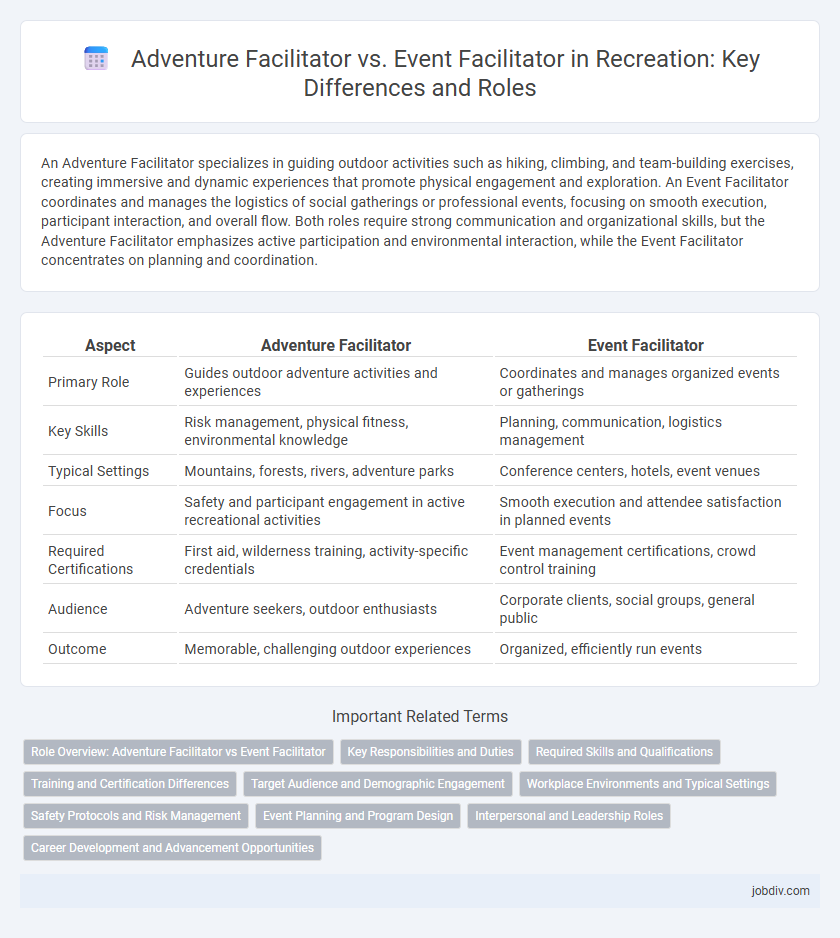An Adventure Facilitator specializes in guiding outdoor activities such as hiking, climbing, and team-building exercises, creating immersive and dynamic experiences that promote physical engagement and exploration. An Event Facilitator coordinates and manages the logistics of social gatherings or professional events, focusing on smooth execution, participant interaction, and overall flow. Both roles require strong communication and organizational skills, but the Adventure Facilitator emphasizes active participation and environmental interaction, while the Event Facilitator concentrates on planning and coordination.
Table of Comparison
| Aspect | Adventure Facilitator | Event Facilitator |
|---|---|---|
| Primary Role | Guides outdoor adventure activities and experiences | Coordinates and manages organized events or gatherings |
| Key Skills | Risk management, physical fitness, environmental knowledge | Planning, communication, logistics management |
| Typical Settings | Mountains, forests, rivers, adventure parks | Conference centers, hotels, event venues |
| Focus | Safety and participant engagement in active recreational activities | Smooth execution and attendee satisfaction in planned events |
| Required Certifications | First aid, wilderness training, activity-specific credentials | Event management certifications, crowd control training |
| Audience | Adventure seekers, outdoor enthusiasts | Corporate clients, social groups, general public |
| Outcome | Memorable, challenging outdoor experiences | Organized, efficiently run events |
Role Overview: Adventure Facilitator vs Event Facilitator
An Adventure Facilitator specializes in guiding outdoor activities such as hiking, climbing, or kayaking, ensuring participant safety and enriching the experience through environmental education and skill development. An Event Facilitator manages the planning, coordination, and execution of events, focusing on logistics, attendee engagement, and seamless operation. Both roles require strong communication and organizational skills but differ in setting and core responsibilities within recreational experiences.
Key Responsibilities and Duties
An Adventure Facilitator is responsible for leading outdoor activities such as hiking, climbing, and kayaking, ensuring participant safety through risk management and providing experiential learning opportunities. An Event Facilitator coordinates logistical aspects of recreational events, including scheduling, resource allocation, and participant engagement, to guarantee smooth execution. Both roles require strong communication skills and the ability to adapt to dynamic environments, but the Adventure Facilitator emphasizes hands-on activity leadership while the Event Facilitator focuses on organizational management.
Required Skills and Qualifications
Adventure facilitators require strong outdoor survival skills, risk management expertise, and certifications in first aid and wilderness training to ensure participant safety in dynamic environments. Event facilitators need exceptional organizational abilities, communication skills, and experience in logistics coordination, often possessing qualifications in event management or hospitality. Both roles benefit from leadership qualities and the capacity to manage diverse groups, but their core skill sets align with the nature of the activities they oversee.
Training and Certification Differences
Adventure facilitators require specialized training in outdoor survival skills, risk management, and emergency response certifications such as Wilderness First Responder and CPR. Event facilitators typically undergo training focused on event planning, crowd management, and safety regulations, with certifications like Certified Meeting Professional (CMP) being common. The distinction lies in adventure facilitators' need for physical and environmental expertise, while event facilitators prioritize organizational and logistical skills.
Target Audience and Demographic Engagement
Adventure facilitators primarily target thrill-seeking individuals and groups interested in outdoor activities like hiking, climbing, and kayaking, often engaging younger, active demographics seeking experiential challenges. Event facilitators focus on broader audiences including corporate clients, families, and community groups, emphasizing structured activities such as workshops, seminars, and celebrations that cater to diverse age ranges and interests. Tailoring engagement strategies to these distinct demographics ensures optimized participation and enhanced recreational experiences.
Workplace Environments and Typical Settings
Adventure facilitators primarily operate in outdoor, natural environments such as forests, mountains, and rivers, designing dynamic and physically engaging activities that promote team building and personal growth. Event facilitators typically work in controlled indoor or urban settings like conference centers, hotels, or corporate offices, managing logistics and schedules to ensure smooth execution of meetings, workshops, or seminars. Both roles require adaptability and strong interpersonal skills but differ significantly in their typical workplace environments and activity focus.
Safety Protocols and Risk Management
Adventure facilitators implement rigorous safety protocols and dynamic risk management tailored to outdoor environments such as climbing, rafting, or hiking, prioritizing participant well-being amid unpredictable conditions. Event facilitators focus on comprehensive safety measures including crowd control, emergency response plans, and hazard assessments specific to structured settings like concerts or festivals. Both roles require specialized training to anticipate risks and enforce compliance with industry standards, ensuring a secure and enjoyable experience.
Event Planning and Program Design
Adventure facilitators specialize in designing immersive outdoor activities that emphasize physical challenges and team-building exercises, often requiring risk management expertise. Event facilitators focus on coordinating logistics, managing schedules, and ensuring smooth execution of diverse events, including conferences, workshops, and social gatherings. Both roles demand strong organizational skills, but adventure facilitators prioritize experiential engagement while event facilitators optimize program flow and audience experience.
Interpersonal and Leadership Roles
Adventure Facilitators specialize in guiding participants through dynamic outdoor challenges, emphasizing teamwork, risk management, and transformational experiences. Event Facilitators focus on coordinating activities, managing logistics, and ensuring smooth communication among diverse stakeholders during structured events. Both roles require strong interpersonal skills and leadership to motivate groups and resolve conflicts effectively.
Career Development and Advancement Opportunities
Adventure facilitators develop skills in outdoor leadership, risk management, and team building, opening pathways to roles in wilderness therapy, expedition leadership, and eco-tourism management. Event facilitators gain expertise in logistics, stakeholder coordination, and program design, enabling advancement into corporate event management, conference planning, and community engagement roles. Both career paths offer growth opportunities through certifications and specialized training but diverge based on skill sets and industry focus within the recreation sector.
Adventure Facilitator vs Event Facilitator Infographic

 jobdiv.com
jobdiv.com